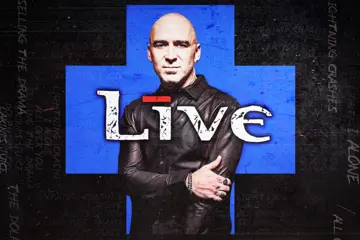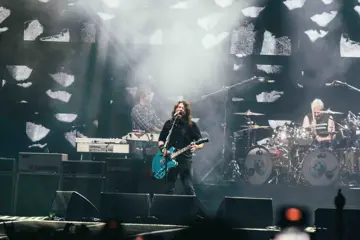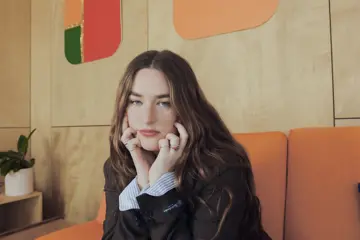 Zola Jesus
Zola Jesus“I definitely feel like Conatus, it laid me bare in comparison to Stridulum,” she laughs. “I felt I needed to make things more up front, I didn't want to hide anything. Even before Stridulum I was coming from music that was completely lo-fi and the vocals were covered in reverb, so I was able to hide a lot. And you know, that isn't a skill; you aren't a skilful musician if you are hiding things. It isn't very honest either, and so I just wanted to wipe that all away.”
Conatus shows a new direction for Zola Jesus from the most basic level, with the cover art showing Danilova in white, wrapped in white gauze, with a white background. The album itself revels in high-end production, offering more lush compositions that complement her voice rather than mask it. Nevertheless, as with everything she has done in the past, such an approach has shone a light on the subject matter contained therein, which has remained darkly evocative and solemn. Conatus then remains an uneasy listen, as the stripping away of both musical and social barriers brings the focus to the dark world that the music inhabits.
“I felt that with the last album that I was hiding a little bit, something that can be difficult to confront within you. In some ways Stridulum was even better produced, because I feel that it was very flat, which really worked. This time I wanted to feel like there were a lot of dimensions, and yet I don't want my voice to sound good every single second. There is vulnerability in my voice, and although I'm afraid of that vulnerability because I'm such a perfectionist and from studying opera, it was important that I be exposed, that that vulnerability was the clear thing that could be identified when listening to that record.”
Don't miss a beat with our FREE daily newsletter
Danilova's background in opera makes sense when hearing her incredible voice unleashed, yet it is a genre of singing that is inexorably bound by structure and discipline. Whilst this may seem incongruous to the end result, Danilova asserts the deeper machinations of her sound are deeply ingrained with stricture despite breaking out and discovering her own voice.
“For me it's hard to identify my voice versus what opera is because my voice was developed in those lessons. I was so young when I was studying opera, so it's impossible to see the difference. Sometimes I feel like it destroys me in a way, like you are losing an asset. I was taking those lessons once a week, twice a week, practising every day, and it was during a time in my life when my body was changing and my voice was sensitive to my training, so my voice developed operatically because I was taking those lessons so much. When I'm singing now, I can't erase that; it's fully ingrained, for better or for worse.”
Performances have certainly changed for Danilova also. When starting out as Zola Jesus in the live arena, she was a tour de force, working on her own terms. Proudly proclaiming that “I wrote these songs on my own, and I will play them on my own”, she ran riot with only a backing track as cover. It was an indelible image – this diminutive woman owning venues with only her voice. However, the performances were heightened by her approach to performing – restlessly stalking and pacing the stage, crouching down out of sight or climbing on fold backs, the actions of a caged animal. Danilova cringes at the memory, conceding “That was the only way I could perform. Singing and playing at the same time, I couldn't emotionally handle that, there was too much stimulation for me that I couldn't handle the anxiety. I could only handle doing one thing at a time. But even as I needed to occupy myself, I couldn't handle the stage, I couldn't handle being watched. Looking at the audience and not being a part of it was very hard for me for a long time. I was precious about my songs before, I felt that having a band would be detrimental. I think people expect me to have this machine behind me, because I'm a small young girl, but that gave me a further sense of pride for doing it all on my own. However, the last tour I played like that (in 2010 supporting Xiu Xiu) was unhealthy for me, and I vowed never to do another tour like that again. I cannot get through a tour playing like that. It's utterly draining.”
That said, music will always be personal for Danilova, for better or for worse. “Music to me is personal, it's an unravelling of the self. Every song is about exploring yourself or about human emotion. All the questions I have about who I am and why I'm here in the first place are wrapped up in what I do. Sometimes I wonder what it would be like to work with a producer, to hand over a part of the musicmaking process, or to sit in the passenger seat and sing about something outside of me, but what would be the point? I admire the confessional tone, and to go in the other direction would be to make mindless pop music. There is nothing in that. Music is therapy, and if there is nothing therapeutic about what you are doing, why do it in the first place?”
The evolution of Zola Jesus hasn't been an easy experience, which has been continually exacerbated by growing exposure and a larger, more expectant audience. “I have always valued live music – I don't like pre-recorded music. I think it's cheap, even just pushing a button for a sampler is not what music is. You want to see the music take shape before you. It would be much easier if I didn't have to battle my own demons. People talk about crumbling under the pressure of what others expect of them, but for me it's what I expect from myself; that's the biggest thing. A lot of my music I feel stunted by that hindrance. Then to get to the other people, outside myself, I have to either not care or get into overdrive. Having dealt with all that pent-up frustration, anxiety and confusion inside of me, it's probably why I'm making music in the first place.”















